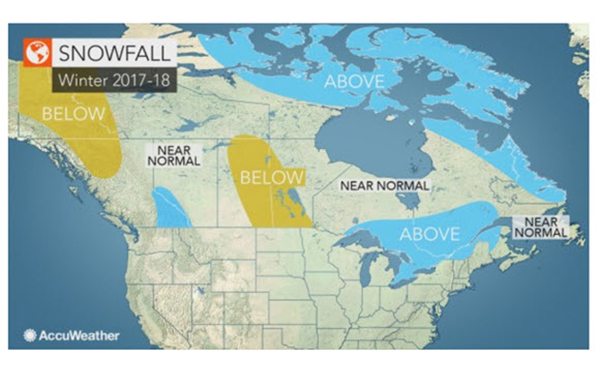Home »

La Niña to bring lots of snow: AccuWeather
A forecast for the upcoming winter holds good news for ski resorts and powder hounds.
AccuWeather reports early snow will bring good skiing conditions to Western Canada.
As waves of Arctic air focus on the prairies, rounds of storms will deliver plenty of snow to the Canadian Rockies.
The ski season in Western Canada is expected to get off to a very good start with a quickly established snowpack, stated AccuWeather Canadian Weather Expert Brett Anderson.
Although the heaviest snow will be confined to the mountains, some snow is expected to make its way all the way to the coast of British Columbia, including around Vancouver and Victoria.
“There will be an increased opportunity for a couple of Arctic intrusions, which may eventually set the stage for a few snow events near the coast,” Anderson said.
Meanwhile, drier-than-normal conditions are in the forecast farther north in British Columbia with only a few storm systems tracking far enough north to bring a significant amount of snow.
The weather pattern setting up over Canada this winter will be influenced by the development of La Niña.
“AccuWeather.com meteorologists expect weak La Niña conditions in the equatorial Pacific, which is expected to play a role in the overall weather pattern across North America during the upcoming winter,” Anderson said.
 While folks in the Rockies and Purcells may get sick of shoveling snow, we can at least take heart in knowing we are on the warmer side of the mountains.
While folks in the Rockies and Purcells may get sick of shoveling snow, we can at least take heart in knowing we are on the warmer side of the mountains.
Waves of arctic air will blast across the Canadian Prairies in the coming months, causing temperatures to plummet to dangerously low levels multiple times throughout the winter, AccuWeather predicts.
These Arctic intrusions will be short-lived and followed up by fairly quick warm-ups in the western Prairies, including Calgary and Edmonton.
Meanwhile, winter will start off on a mild note across the eastern Prairies before the bitter cold settles across the region.
“Compared to last winter, the upcoming winter is expected to be colder from the eastern prairies to Quebec,” Anderson said.
e-KNOW







